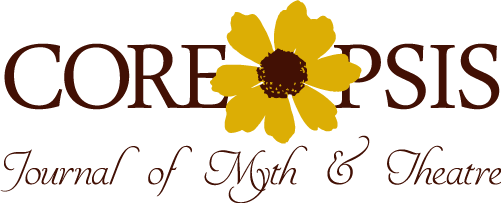An Artist’s Statement
By Lauren Raine
“Myth comes alive as it enters the cauldron of evolution,
drawing energy from the new storytellers who shape it.”
– Elizabeth Fuller, the Independent Eye Theatre
Mythos is the archetypal ground on which cultures are built, the sometimes fluid template of religions, and the means by which we decide what is sacred and what is not. In other words, as the poet Muriel Rukeyser famously said, “The world is made of stories, not atoms.” Artists are technicians of story. So what are the stories that we are telling about our world, and how are they manifesting? How are we, as artists, acting as myth makers?
Ritual is a way of bringing the storied realm into the physical realm. There is something incredibly transformative about not simply observing, but becoming part of the story. By putting on the mask, or passing the magical chalice, or touching the Earth with imagined roots we embody mythos. Meaningful ritual is by and large lost in the contemporary world – but it’s a potent, creative field that is wide open for artists to re-animate.
When I went to Bali to study temple mask traditions I was fortunate to produce collaborative masks with Balinese mask makers while there. In traditional cultures, such as Bali, sacred masks are regarded as “vessels for the gods” to gain entry into this world, to bless or to instruct. Their sacred mask traditions inspired me to create the Masks of the Goddess collection, which was devoted to the divine feminine throughout the world. As the masks were used by dancers, storytellers, and ritualists, I found myself in a grand conversation, and the masks themselves gained energy, story, and “manna” from those who used them. After 20 years, they are still travelling, most recently to the Parliament of World Religions.
Another series of masks, collectively called Numina after the Roman word for spirits of place, is a celebration of my lifelong conversation with the numinous intelligence in nature, and I offer them to others to give them voice. We have always personified the vast, mysterious and yet intimate forces of nature, as gods and goddesses, as kachinas, as the fey. What might the Spirit of the River have to say as humans pollute our waters? What might the Spirit of the Forest speak of? What knowledge could the the Mountain Gods impart?
How might we use theatre, and participatory ritual, to engage others in the Great Conversation? How might the renewal of contemporay Ritual Theatre help us to "re-enchant" the world?
Lauren Raine MFA




